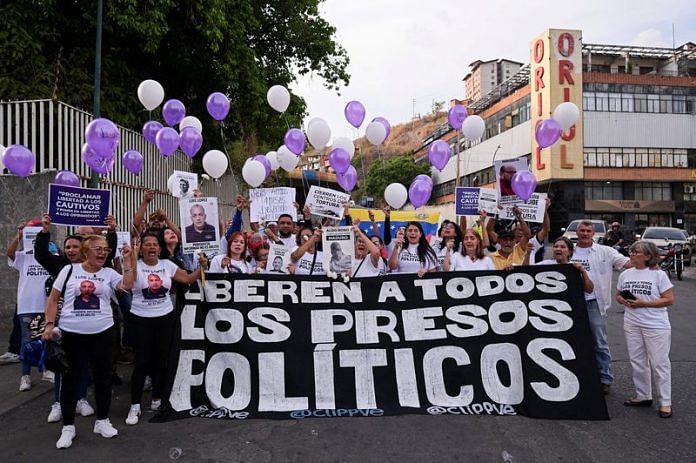CARACAS (Reuters) -Venezuela Attorney General Tarek Saab said on Monday that his office will investigate El Salvador’s President Nayib Bukele and two other officials for the alleged abuse of Venezuelans who were detained in the Central American country.
More than 250 Venezuelans held in El Salvador’s notorious CECOT prison returned to Venezuela on Friday, under the terms of a prisoner exchange agreed with the United States.
Detainees suffered human rights abuses ranging from sexual abuse to beatings, were denied medical care or treated without anesthesia and given food and water that made them ill, Saab said at a press conference.
As well as Bukele, Venezuela will investigate El Salvador’s Justice Minister Gustavo Villatoro and Head of Prisons Osiris Luna Meza, Saab said, after showing videos of former detainees recounting torture and showing injuries – including a missing molar, bruising and scars – they said were the result of the abuse.
Bukele’s office did not immediately respond to a request for comment. Reuters was not able to immediately confirm the assertions made in the videos. Two of those shown speaking were identifiable as former detainees in CECOT.
The Venezuelans were sent to El Salvador from the United States in March after U.S. President Donald Trump invoked the 1798 Alien Enemies Act to deport alleged members of the Tren de Aragua gang without normal immigration procedures.
The deportations drew fierce criticism from human rights groups and a legal battle with the Trump administration. Family members and lawyers of many of the men deny they had gang ties.
The former detainees arrived near Caracas on Friday, where some reunited with their families, but they have not yet returned to their own homes.
Yajaira Fuenmayor, the mother of former El Salvador detainee Alirio Guillermo Belloso, said on Sunday afternoon from her home in Maracaibo that she was preparing him arepas, traditional corn cakes, as a welcome.
“I can’t stop thinking of the hunger my son went through. I have a salad ready, some grilled arepas because he loves them, and there is fish in the refrigerator to fry,” she said.
The government has said the men will be medically evaluated and interviewed before being released. It has always said the El Salvador detentions were illegal and that only seven of the men had serious criminal records.
POLITICAL PRISONERS FREED
The Venezuelan opposition has regularly critiqued the government of President Nicolas Maduro for holding activists and others in similar conditions within Venezuela.
The U.S. said last week that 80 Venezuelans would be released from Venezuelan jails as part of the swap, which also freed 10 Americans held in Venezuela.
Forty-eight Venezuelan political prisoners have so far been released, legal rights advocacy group Foro Penal said earlier on Monday on X.
“We regret the absence of an official list that allows us to verify with more precision,” the group said, adding that some lists in circulation have included people not classed as political detainees, people who had already been released and even prisoners who have died. “At Foro Penal we remain in coordination with families working to verify other cases.”
The communications ministry did not immediately respond to a request for comment about who is set to be released and whether any of them will be subject to house arrest or other alternatives to detention.
The main opposition coalition in Venezuela has cheered the release of the prisoners.
But the coalition said on Sunday nearly 1,000 people remain jailed in Venezuela for political reasons and 12 others have been arrested in recent days, in what it called a “revolving door” for political prisoners.
(Reporting by Mayela Armas and Vivian Sequera, additional reporting by Mariela Nava in Maracaibo and Sarah Kinosian in Mexico City; Writing by Julia Symmes Cobb; Editing by Rosalba O’Brien)
Disclaimer: This report is auto generated from the Reuters news service. ThePrint holds no responsibility for its content.




